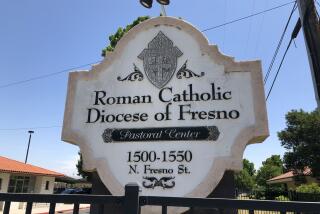Discontent Seen as Costly to Episcopal Church : Finances: Some local parishes may opt to withhold money from the national church to protest a perceived extreme liberalism at the top of the denomination.
Episcopal Church traditionalists are predicting that more and more parishes and dioceses will opt to withhold funds from the national church to protest what they perceive as extreme liberalism at top levels of the denomination.
The Rev. Robert Shackles, president of the traditionalist Prayer Book Society based in Louisville, Ky., predicts that a budget crisis in the denomination could be the result of dissenters withholding funds.
“It’s early--but not too early to believe there is a definite trend,” he said.
Despite those assertions--and despite decisions in Pittsburgh and Ft. Worth aimed at withholding funds--a spokesman at church headquarters in New York rejected suggestions that there is any protest trend in the offing.
In cases where money has already been withheld, the reasons are not always clear-cut, church leaders say.
The spokesman, James Solheim, news director at Episcopal Church headquarters, pointed to results of a recent survey of activities at diocesan conventions to support his contention that money is not being used as a weapon against the church bureaucracy.
In an interview Monday, Shackles said he has heard predictions of shortfalls of as much as $10 million to $12 million in the national church’s projected $43-million budget for 1992. He said the shortfall would in large measure result from disgruntled Episcopalians withholding funds from the national church.
“I do believe it’s developing into an across-the-board discontent,” said Shackles, rector of St. Paul’s Episcopal Church in Muskegon, Mich.
Discontent is not only rife in traditionalist parishes such as his own, Shackles said, but also in more liberal congregations that believe the church is being too liberal.
Traditionalist groups such as the Prayer Book Society and Episcopal Synod of America are up in arms over issues such as the ordination of practicing homosexuals, liturgies that use gender-neutral references to God and female priests.
Solheim did acknowledge that the recession has taken its toll in dioceses around the country.
“Our reading is that they (the church’s 121 dioceses) are going to maintain their contributions even if it hurts, and it does hurt,” said Solheim.
According to the survey conducted by the Episcopal News Service, several diocesan conventions discussed cutting support for the national church but decided against doing so.
The strongest protest vote to date occurred in mid-November at the annual meeting of the Pittsburgh diocese.
By a 2-1 margin, delegates voted to approve a resolution allowing parishes to withhold 1992 contributions to the national church--a sum that could reach a maximum of $327,000--because the church has permitted ordination of practicing homosexuals.
In the dioceses of Dallas and Ft. Worth, diocesan conventions also voted to withhold funds from the national church in 1992--about $171,000 in Ft. Worth and $225,000 in Dallas.
In both cases there were expressions of discontent with national church policies, but in neither case was it clear that those policies were the primary reason funds were diverted.
Concerns about the withholding of funds to the national church prompted a response from Episcopal Church Presiding Bishop Edmond L. Browning. “I hope and pray that those who have considered such a response will have second thoughts,” he said at an Executive Council meeting in early November.
More to Read
Sign up for Essential California
The most important California stories and recommendations in your inbox every morning.
You may occasionally receive promotional content from the Los Angeles Times.










